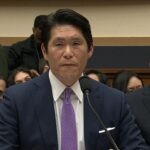
Published May 4, 2023
There’s a line from conservative columnist and CNN political commentator Jonah Goldberg that gets at many Americans’ views toward the border: “My preferred immigration policy is that we have one.”
We don’t. Polls show conflicting, even contradictory, emotions when it comes to immigration. Americans take pride in being a nation of immigrants, but also tell pollsters they fear an “invasion” and want clear rules for those coming to our borders to follow.
In a Gallup poll last summer, 69% of Americans said they wanted the level of immigration to stay the same or be lowered, while 70% also agreed with the idea that immigration was a good thing for the country. Yet researchers have found migrant surges at the southern border can lead to a rise in public concern around the topic.
That’s why the upcoming expiration of pandemic-era border closures looms so large for the White House. Trying to balance the desire for a humanitarian solution at the border with the need for structure and security is difficult in the best of times. And the impending crisis on the southern border is far from the best of times.
The pandemic-era policy known as Title 42 gave immigration authorities emergency powers to turn back border crossers without giving them a chance to apply for asylum. It was admittedly a blunt-force instrument, but one that gave the US Customs and Border Patrol and other immigration enforcement a quick and easy way of keeping the system from being overloaded.
When Title 42 expires on May 11, US officials are bracing for a renewed surge of immigration to border facilities. Border personnel are already experiencing an increased number of crossings. Data from US Customs and Border Protection shows apprehensions and expulsions rising in a familiar seasonal pattern, with 2023 crossings above even last year’s elevated levels. According to reporting by the Wall Street Journal, an estimated 35,000 migrants are believed to be in Ciudad Juárez, Mexico, waiting to cross into the US after the restrictions are lifted.
Border personnel will likely be faced with either operating the kinds of overcrowded facilities that the Trump administration was repeatedly criticized for, or potentially releasing migrants into the country with no court date and no guarantee they’ll be found again. Either option spells political trouble.
There is plenty of blame to go around when it comes to the issue of immigration, and Republicans will certainly never be ones to let a crisis, real or perceived, on the US-Mexico border go to waste. But Democrats will be left holding the hot potato if they do not treat the end of Title 42 as a substantive policy problem to be solved rather than a political optics challenge to be managed. Doing so will require them to stand up to their left-most flank.
On Tuesday, the Biden administration took an initial step toward recognizing the severity of the situation by assigning 1,500 active-duty troops to provide logistical support to border enforcement. Homeland Security Secretary Alejandro Mayorkas has made a rhetorical push as well. “Let me be clear,” he said last week. “Our border is not open and will not be open after May 11.” Sen. Mark Kelly of Arizona has also been a leading Democratic voice backing aggressive border enforcement in the wake of Title 42.
The Biden administration clearly hope this quells some of the rising tensions both at the border and in Washington, DC. Many of the White House’s allies, who were quick to denounce a similar approach when it was undertaken by the Trump White House, have held their fire, though Sen. Bob Menendez of New Jersey released a statement saying the “militarization of the border is unacceptable.”
The Biden administration knows it must walk a careful line. Many progressives’ approach to immigration focuses on the needs and rights of migrants and asylees, and tends to look skeptically toward increased enforcement, as Menendez’s statement indicates. Some centrist Democrats have found political success advocating for more border enforcement, but many still find themselves trapped between public opinion and their more restive progressive base.
Democrats may be tempted to respond to the end of Title 42 by turning to a familiar page in their political playbooks. They may blame the border on the foibles of the Trump administration, focus on the amorphous need for “hemispheric solutions” or try to focus on other policy fights.
But part of the downside of winning political elections is being held accountable for what happens under your watch. And if Democrats are seen as responding to a massive wave of pressure on the southern border predominately by blaming Trump’s missteps or complaining about media coverage, they’ll be rightly pilloried. Border enforcement can be done humanely, but it must be done.
As evidenced by the troop deployment, the Biden administration has at least some of the tools to mitigate some of the blowback. It can ramp up border enforcement, speed up deportation proceedings and consider reviving policies like the “Remain in Mexico” approach. If undertaken seriously, achieving stability on the border could help send a message to the Northern Triangle countries of Guatemala, Honduras and El Salvador, where many of the migrants’ journeys originate, that they should stop undertaking the perilous journey.
But these types of steps will require being willing to take the slings and arrows of allies on the progressive left and pro-immigration groups. And too much rhetorical focus on “making migration more safe, orderly and humane,” in the words of Secretary of State Anthony Blinken, threatens to obscure the more short-term objective of clamping down on unauthorized entries.
Larger questions of how to treat immigrants already living in the United States, and how to treat those brought to the country as minors, will continue to rack our politics. But answering those presupposes a sense of control on the southern border. If the end of Title 42 spells an unprecedented surge in border crossings and asylum claims, Democrats will not only be facing a short-term political loss, but a dynamic that threatens any longer-term bargains over immigration reform as well.
Patrick T. Brown is a fellow at the Ethics and Public Policy Center, where his work with the Life and Family Initiative focuses on developing a robust pro-family economic agenda and supporting families as the cornerstone of a healthy and flourishing society.
Picture from CNN
Patrick T. Brown is a fellow at the Ethics and Public Policy Center, where his work with the Life and Family Initiative focuses on developing a robust pro-family economic agenda and supporting families as the cornerstone of a healthy and flourishing society.









